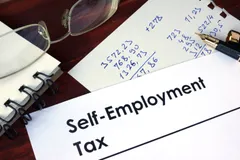Introduction
Being self-employed comes with many benefits, such as independence and flexibility. However, it also brings additional responsibilities, including managing your own taxes. Understanding the self-employed tax rate is crucial to ensure compliance with tax laws and optimize your financial situation. In this comprehensive guide, we will explore the intricacies of the self-employed tax rate, deductions and credits available, and strategies to minimize your tax liability.
What is the Self-Employed Tax Rate?
The self-employed tax rate refers to the specific tax obligations that individuals who work for themselves must fulfill. Unlike employees who receive a paycheck with taxes automatically deducted, self-employed individuals are responsible for calculating and paying their own taxes.
Calculating the Self-Employed Tax Rate
To determine your self-employed tax rate, you need to consider two main components: income tax and self-employment tax.
Income Tax for the Self-Employed
Self-employed individuals are subject to federal income tax, similar to individuals who are not self-employed. The tax rate you pay depends on your total taxable income and filing status. However, self-employed individuals have additional considerations due to their unique financial situation.
Self-Employment Tax
Self-employment tax is an additional tax imposed on self-employed individuals to fund Social Security and Medicare. It is equivalent to the employer and employee portions of these taxes. Currently, the self-employment tax rate is 15.3% of your net self-employment income
Deductions and Credits for the Self-Employed
To alleviate the tax burden, self-employed individuals can take advantage of various deductions and credits. Here are some key deductions and credits that can help reduce your taxable income:
Home Office Deduction:
If you have a dedicated space in your home for conducting business activities, you may be eligible for the home office deduction.
Business Expenses:
Expenses directly related to your business, such as supplies, equipment, and travel expenses, can be deducted.
Health Insurance Premiums:
Self-employed individuals may be able to deduct their health insurance premiums.
Retirement Contributions:
Contributions made to retirement plans, such as a Simplified Employee Pension (SEP) IRA or a solo 401(k), can be tax-deductible.
Self-Employment Tax Deduction:
You can deduct a portion of your self-employment tax to offset the overall tax liability.
Strategies for Optimizing Your Tax Liability
Minimizing your tax liability requires strategic planning and attention to detail. Consider implementing the following strategies to optimize your tax situation:
Keep Accurate Records
Maintain meticulous records of your income and expenses. This will help ensure you claim all eligible deductions and credits and accurately report your income.
Make Estimated Tax Payments
As a self-employed individual, you are responsible for making estimated tax payments throughout the year. Failure to do so may result in penalties and interest charges.
Consult with a Tax Professional
Navigating the complexities of self-employed taxes can be challenging. Seeking advice from a tax professional can provide valuable insights and ensure compliance with tax regulations.
Frequently Asked Questions (FAQs) about Self-Employed Tax Rate
What is the self-employed tax rate for 2023?
The self-employment tax rate for 2023 remains at 15.3% of your net self-employment income.
Can I deduct business-related travel expenses?
Yes, business-related travel expenses, such as airfare, accommodations, and meals, can be deductible if they are directly related to your self-employed work.
How can I pay my self-employment taxes?
Self-employment taxes can be paid through estimated tax payments made quarterly to the IRS.
Conclusion
Navigating the self-employed tax rate is a vital aspect of managing your finances as a self-employed individual. By understanding the calculations, leveraging deductions and credits, and implementing strategies to optimize your tax liability, you can ensure compliance with tax laws while maximizing your financial well-being. Stay informed, keep accurate records, and consult with professionals when needed to make the most of your self-employment journey.







